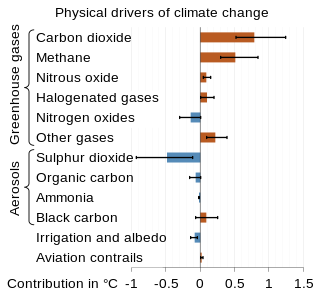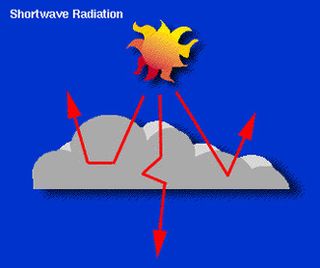Related Research Articles

The scientific community has been investigating the causes of climate change for decades. After thousands of studies, it came to a consensus, where it is "unequivocal that human influence has warmed the atmosphere, ocean and land since pre-industrial times." This consensus is supported by around 200 scientific organizations worldwide, The dominant role in this climate change has been played by the direct emissions of carbon dioxide from the burning of fossil fuels. Indirect CO2 emissions from land use change, and the emissions of methane, nitrous oxide and other greenhouse gases play major supporting roles.

Cloud feedback is a type of climate change feedback, where the overall cloud frequency, height, and the relative fraction of the different types of clouds are altered due to climate change, and these changes then affect the Earth's energy balance. On their own, clouds are already an important part of the climate system, as they consist of water vapor, which acts as a greenhouse gas and so contributes to warming; at the same time, they are bright and reflective of the Sun, which causes cooling. Clouds at low altitudes have a stronger cooling effect, and those at high altitudes have a stronger warming effect. Altogether, clouds make the Earth cooler than it would have been without them.
Keith Peter Shine FRS is the Regius Professor of Meteorology and Climate Science at the University of Reading. He is the first holder of this post, which was awarded to the university by Queen Elizabeth II to mark her Diamond Jubilee.
Richard Siegmund Lindzen is an American atmospheric physicist known for his work in the dynamics of the middle atmosphere, atmospheric tides, and ozone photochemistry. He is the author of more than 200 scientific papers. From 1972 to 1982, he served as the Gordon McKay Professor of Dynamic Meteorology at Harvard University. In 1983, he was appointed as the Alfred P. Sloan Professor of Meteorology at the Massachusetts Institute of Technology, where he would remain until his retirement in 2013. Lindzen has disputed the scientific consensus on climate change and criticizes what he has called "climate alarmism".

Michael Evan Mann is an American climatologist and geophysicist. He is the director of the Center for Science, Sustainability & the Media at the University of Pennsylvania. Mann has contributed to the scientific understanding of historic climate change based on the temperature record of the past thousand years. He has pioneered techniques to find patterns in past climate change and to isolate climate signals from noisy data.

Susan Solomon is an American atmospheric chemist, working for most of her career at the National Oceanic and Atmospheric Administration (NOAA). In 2011, Solomon joined the faculty at the Massachusetts Institute of Technology, where she serves as the Ellen Swallow Richards Professor of Atmospheric Chemistry & Climate Science. Solomon, with her colleagues, was the first to propose the chlorofluorocarbon free radical reaction mechanism that is the cause of the Antarctic ozone hole.

Inez Fung is a professor of atmospheric science at the University of California, Berkeley, jointly appointed in the department of earth and planetary science and the department of environmental science, policy and management. She is also the co-director of the Berkeley Institute of the Environment.
Julie Michelle Arblaster is an Australian scientist. She is a Professor in the School of Earth, Atmosphere and Environment at Monash University. She was a contributing author on reports for which the Intergovernmental Panel on Climate Change (IPCC) was a co-recipient of the 2007 Nobel Peace Prize. Arblaster was a lead author on Chapter 12 of the IPCC Working Group I contribution to the IPCC Fifth Assessment Report in 2013. She has received the 2014 Anton Hales Medal for research in earth sciences from the Australian Academy of Science, and the 2017 Priestley Medal from the Australian Meteorological and Oceanographic Society. She has been ranked as one of the Top Influential Earth Scientists of 2010-2020, based on citations and discussion of her work.

The contributions of women in climate change have received increasing attention in the early 21st century. Feedback from women and the issues faced by women have been described as "imperative" by the United Nations and "critical" by the Population Reference Bureau. A report by the World Health Organization concluded that incorporating gender-based analysis would "provide more effective climate change mitigation and adaptation."
Robert Jay Charlson was an American atmospheric scientist, climate scientist, pioneer in the fields of climate forcing and climate change, and coauthor of the CLAW hypothesis. Charlson is known for his research in atmospheric chemistry, aerosol physics, aerosol/cloud/climate interaction, aerosol and cloud instrumentation.

Cirrus cloud thinning (CCT) is a proposed form of climate engineering. Cirrus clouds are high cold ice that, like other clouds, both reflect sunlight and absorb warming infrared radiation. However, they differ from other types of clouds in that, on average, infrared absorption outweighs sunlight reflection, resulting in a net warming effect on the climate. Therefore, thinning or removing these clouds would reduce their heat trapping capacity, resulting in a cooling effect on Earth's climate. This could be a potential tool to reduce anthropogenic global warming. Cirrus cloud thinning is an alternative category of climate engineering, in addition to solar radiation management and greenhouse gas removal.
Sreedharan Krishnakumari Satheesh is an Indian meteorologist and a professor at the Centre for Atmospheric and Oceanic Sciences of the Indian Institute of Science (IISc). He holds the chair of the Divecha Centre for Climate Change, a centre under the umbrella of the IISc for researches on climate variability, climate change and their impact on the environment. He is known for his studies on atmospheric aerosols and is an elected fellow of all the three major Indian science academies viz. Indian Academy of Sciences Indian National Science Academy and the National Academy of Sciences, India as well as The World Academy of Sciences. The Council of Scientific and Industrial Research, the apex agency of the Government of India for scientific research, awarded him the Shanti Swarup Bhatnagar Prize for Science and Technology, one of the highest Indian science awards for his contributions to Earth, Atmosphere, Ocean and Planetary Sciences in 2009. He received the TWAS Prize of The World Academy of Sciences in 2011. In 2018, he received the Infosys Prize, one of the highest monetary awards in India that recognize excellence in science and research, for his work in the field of climate change.
Philippe Ciais is a researcher of the Laboratoire des Sciences du Climat et de l'Environnement (LSCE), the climate change research unit of the Institut Pierre Simon Laplace (IPSL). He is a physicist working on the global carbon cycle of planet Earth, climate change, ecology and geosciences.
Arlene M. Fiore is an atmospheric chemist whose research focuses on issues surrounding air quality and climate change.

Edward Hawkins is a British climate scientist who is Professor of climate science at the University of Reading, principal research scientist at the National Centre for Atmospheric Science (NCAS), editor of Climate Lab Book blog and lead scientist for the Weather Rescue citizen science project. He is known for his data visualizations of climate change for the general public such as warming stripes and climate spirals.
Joyce Penner is an atmospheric scientist known for her research on climate change, especially on the impact of aerosols and clouds.
Laura Frances Robinson, born November 1976, is a British scientist who is Professor of Geochemistry at the University of Bristol. She makes use of geochemistry to study the processes that govern the climate. In particular, Robinson studies radioactive elements, as these can be analysed in geological materials. She was awarded the 2010 President's Award of the Geological Society of London.

Ulrike Lohmann is a climate researcher and professor for atmospheric physics at the ETH Zurich. She is known for her research on aerosol particles in clouds.
Susan Claire van den Heever is a South African atmospheric scientist who is a professor at Colorado State University. Her research considers cloud physics and mesoscale modelling. She is a fellow of the American Meteorological Society and an editor of the Journal of the Atmospheric Sciences.
Paquita Zuidema is a Dutch atmospheric and aerosol scientist who researches cloud processes, cloud radiative impacts, and aerosol-cloud interactions. She is a professor and chair of the department of atmospheric sciences at the Rosenstiel School of Marine, Atmospheric, and Earth Science at the University of Miami.
References
- 1 2 "Trude Storelvmo receives UiO's award for Young researchers 2020". Department of Geosciences, University of Oslo. 16 August 2023. Retrieved 6 July 2024.
- ↑ "Trude Storelvmo". Climate Engineering in Context 2021. 17 October 2019. Retrieved 15 September 2021.
- 1 2 "Professor Trude Storelvmo". CompSci: Training in Computational Science, University of Oslo. 25 October 2021. Retrieved 6 July 2024.
- ↑ "ERC FUNDED PROJECTS". ERC: European Research Council. Retrieved 15 September 2021.
- ↑ "IPCC Authors (beta)". archive.ipcc.ch. Retrieved 15 September 2021.
- ↑ "Global and Planetary Change: Editors-in-Chief". Science Direct. Elsevier. 2024. Retrieved 6 July 2024.
- ↑ "Award Abstract # 1352417 - CAREER: The Role of Mineral Dust in Atmospheric Ice Formation, and its Impacts on Past, Present and Future Climate". U.S. National Science Foundation. 24 April 2014. Retrieved 6 July 2024.
- ↑ "Congratulations to Trude Storelvmo who has received an NSF Career Award". The Department of Earth & Planetary Sciences, Yale University. 28 April 2014. Retrieved 6 July 2024.
- ↑ "2018 Awards". American Meteorological Society. 7 January 2018. p. 39. Retrieved 6 July 2024.